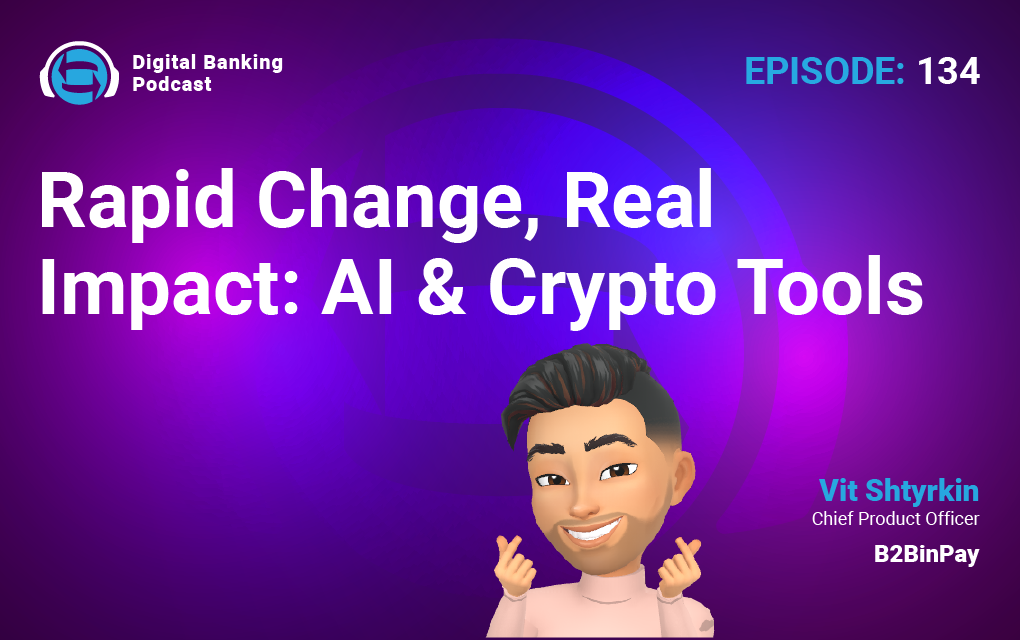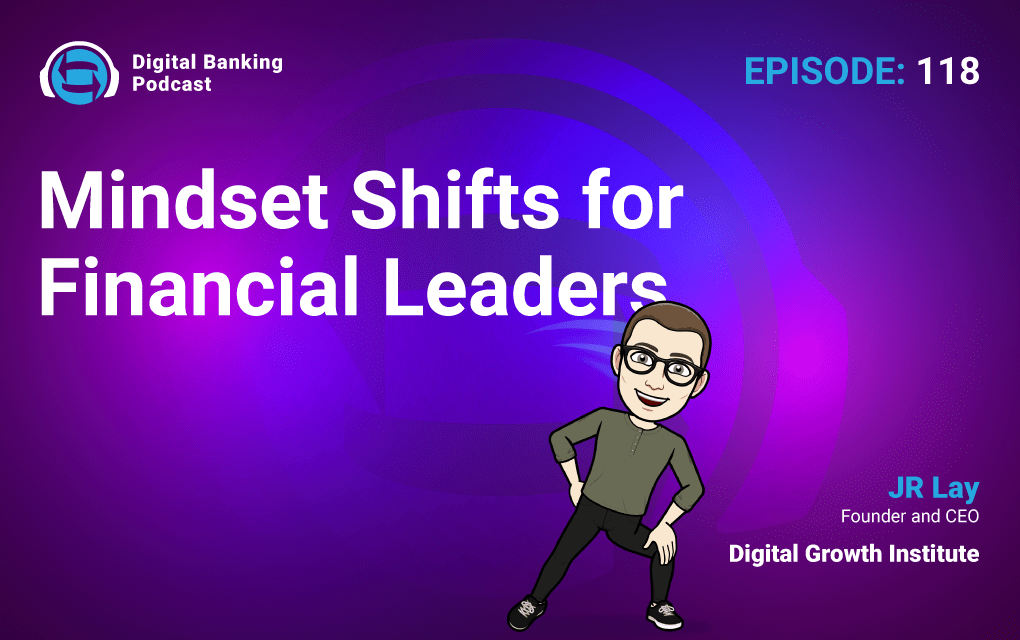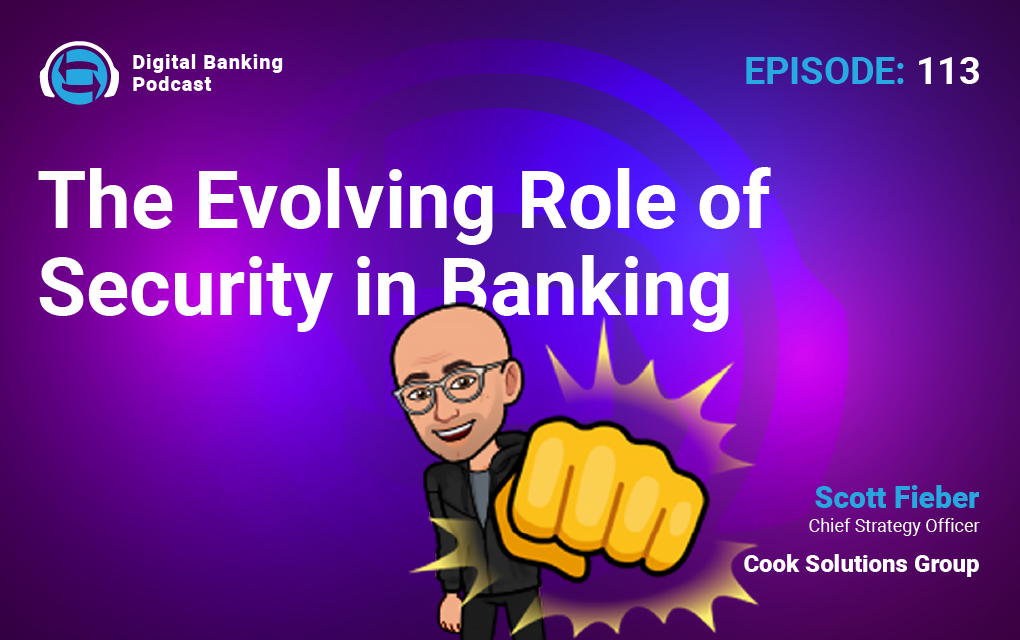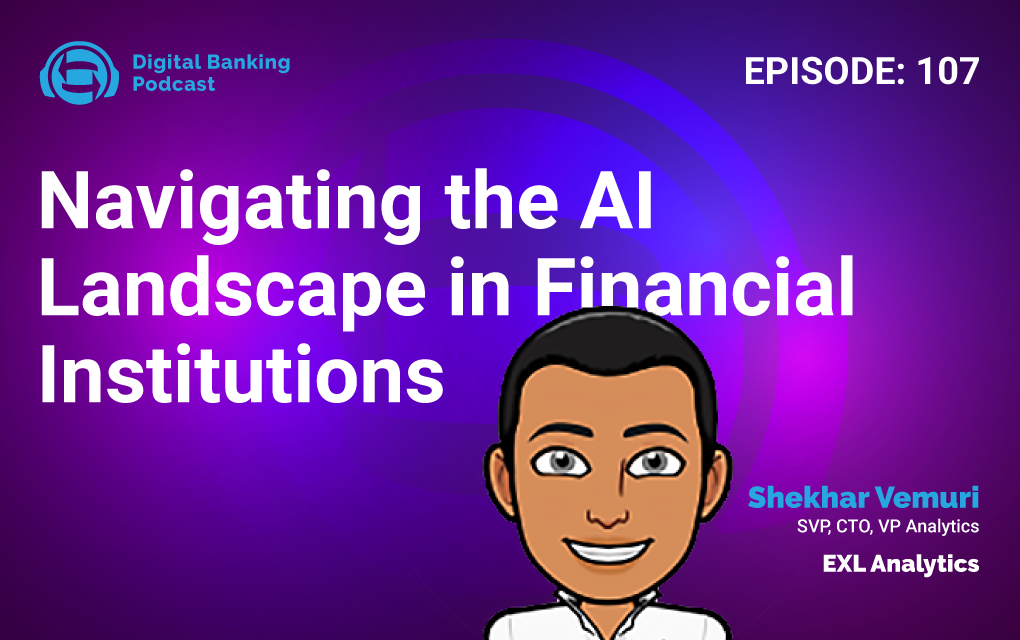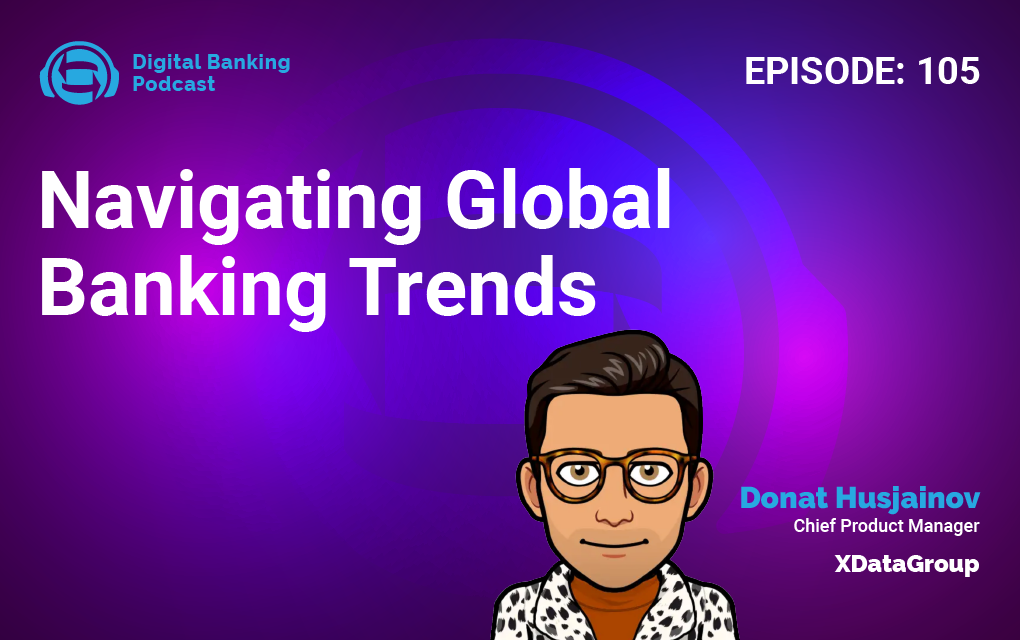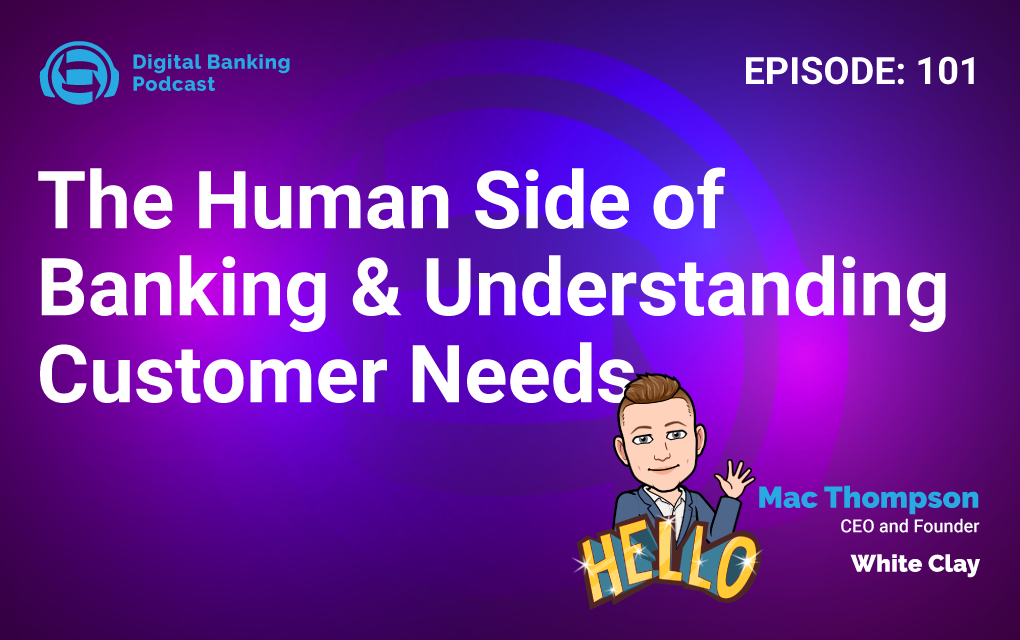Evgeny Filichkin: Why Dubai is the Crypto Hub of the World
“Dubai has perfect legal grounds to flourish as a crypto hub. They do everything that crypto startups need to come to get financing and to flourish. So that’s the center of attraction now. Secondly, the community here has certain traits, a lot of young people, a lot of people with an innovative mindset.”
Episode Summary
In this episode of the Digital Banking Podcast, host Josh DeTar spoke with Evgeny Filichkin from Keytom. Evgeny shared his journey from Russia to Dubai, exploring the evolution of his career in cryptocurrency and alternative trading. He explained why Dubai has become a premier hub for crypto startups, citing its favorable legal infrastructure and vibrant, innovative community.
Filichkin elaborated on the benefits of Dubai’s regulatory environment, which fostered growth for crypto businesses by providing fast, cost-effective ways to establish legal infrastructure. He contrasted this with the regulatory challenges in the U.S., emphasizing the balance needed between oversight and innovation to avoid stifling progress. The discussion highlighted how Dubai’s approach to regulation had attracted numerous startups and investors to the region.
The episode also covered the future of cryptocurrency and its impact on traditional finance. Filichkin explained the role of stablecoins and Central Bank Digital Currencies (CBDCs) and how they offered new opportunities for financial transactions. He provided insights into the potential of blockchain technology beyond currency, touching on its applications in various sectors like accounting and legal services.
Key Insights
⚡ Dubai is a Prime Hub for Crypto Startups
Dubai’s regulatory environment offers significant advantages for crypto startups. The city provides fast, cost-effective ways to establish legal infrastructure, making it an attractive destination for businesses in the crypto space. Dubai’s digital asset-friendly policies and free zones allow companies to open bank accounts and secure financing without the common hurdles faced in other jurisdictions. This supportive environment, combined with a vibrant, innovative community, makes Dubai an ideal location for startups looking to thrive in the alternative finance sector. The legal framework ensures transparency and smooth operations, fostering growth and attracting international investment.
⚡ Stablecoins Provide a Solution to Traditional Transfer Limitations
Stablecoins offer a practical alternative to traditional SWIFT transfers, especially in regions restricted from participating in these systems. By linking stablecoins to the USD, users can conduct transactions independently and at lower costs. This system addresses the need for seamless, cross-border financial exchanges without relying on conventional banking networks. The stability of these digital assets, backed by reserves, provides a reliable means of transferring value, making them popular for both personal and business transactions. This innovation in digital finance supports greater financial inclusion and efficiency in global markets.
⚡ Blockchain Technology Extends Beyond Currency
Blockchain technology offers transformative potential beyond its use as a digital currency. It provides innovative solutions for current global challenges, such as improving efficiency in accounting and legal services through trustless systems that eliminate human error. Smart contracts and decentralized ledgers can streamline processes, reduce costs, and increase transparency. This technological advancement facilitates faster, cheaper transactions and enhances the reliability of various operations. The adoption of blockchain is poised to revolutionize multiple industries by providing robust, automated systems that enhance accuracy and trust in transactions.
Today is one of those very special days. You see, Evgeny is calling in today from Dubai. Why Dubai? You might ask. Well, there’s a pretty impressive story behind this specific destination for Evgeny. You see, he was born and raised in Russia and at that time investing and trading was not commonplace in the culture.
But when he was 16, the investment world made a push into Russia, initially with education and information. You And just like any normal 16-year-old, [00:01:00] just kidding. This is where the story starts to get special. Evgeny got hooked on pouring through literature, spending every minute he could to learn about this whole new world that had been opened up to him.
He was so excited by the world of speculative trading. He focused his studies and aggressively pursued finishing his university studies, which were originally focused in the legal space. Early so that at 16 he could pivot to the investing world that he’d become so infatuated with. By his early twenties, he’d moved to Cyprus as it was a Mecca for Forex trading.
Fast forward and as cryptocurrency started to evolve into the next thing in trading, Evgeny moved to Dubai as it had become the new Mecca of trading for this next evolution in emerging markets and alternative trading. Fun fact, when I asked Evgeny, what does a weekend look like for you these days?
He said, well, with summer approaching in Dubai, it’s getting pretty hot and the air is even thinning out. So he said, well, we have nice malls [00:02:00] and nice AC, but it’s Dubai. So you can do anything here anytime you want. I mean, you can go indoor skiing in the middle of the desert. Seriously, you can do anything here in Dubai.
Well, I’m sure we’re going to have to talk a little bit about just the world of Dubai at some point, because that’s one of the places I have yet to visit that just absolutely fascinates me. But Evgeny I’m so, so incredibly honored to have you calling in on your evening to spend some time with me.
Thanks for joining me.
Evgeny Filichkin: Well, thanks for the bright introduction. Hello, Josh.
Josh: Well let’s jump right in, man. I’m super excited about this. We had originally got connected. We did. And it was right before that kind of suspected timing of the Bitcoin having. And that has now happened. And here we are today. And, I think this is one of the topics that really fascinates a lot of folks in traditional finance here in the U. S. Right. I remember when we went through the phase of like Elon [00:03:00] Musk on Jimmy Fallon talking about Dogecoin and watching people go from having a few dollars to being millionaires. And the traditional world here, heads exploded like, Oh my gosh, what is happening?
What does this mean? And I think for a lot of community financial institutions here in the U. S. It was a quick scramble to try and understand what are the implications of this to my business and what are my consumers going to be expecting out of that. But before we jump into that, I’d love to just start with kind of your level set, right?
Like this is your world. This is your area of expertise. So talk to me a little bit about, why is cryptocurrency becoming this next big thing and why has Dubai decided to become a Mecca for this new currency and trading?
Evgeny: Well, first of all, Dubai has perfect legal grounds to flourish as a crypto hub. Actually, that’s the first thing to [00:04:00] mention. They do everything that crypto startups need to come to get financing and to flourish. So that’s the center of attraction now. Secondly, the community here has certain traits, a lot of young people, a lot of people with innovative mindset.
And I think that’s the right spot. If you are in crypto or if you are in alternative finance, that’s the right spot to be exactly at this moment. You know how they say the right time, right people, right place.
Josh: So what is it about Dubai’s kind of legal system that makes it such a great hub for alternative trading?
Evgeny: Well, okay. Just in a nutshell, they have certain digital assets or oasis or other free zones that allow companies involved in crypto to set up a legal infrastructure pretty fast, pretty cheap. And actually [00:05:00] with this a lot of startups are now struggling to open bank accounts in some jurisdictions.
And here it’s not an issue if you are have a proper business plan, if you are communicate openly to regulator and if they understand that everything is transparent and you are just a startup and you just strive to to flourish or just try, strive to acquire, let’s say capitals, attracting investors and everything is fine, they will give you green light. And I think this is the most fascinating part.
Josh: That is interesting because I think, that’s one of the things that obviously, has slowed down a lot of things for cryptocurrencies in the U. S. right is regulation. And there’s always two sides of the coin to regulation. We talk about that for just the traditional markets, right?
For a community bank or credit union. Regulation is both a colossal pain in their butt, but it’s also a good thing, right? And sometimes there does need to be some levels of [00:06:00] oversight. Obviously we’ve got examples in the traditional world with Silicon Valley Bank, and we’ve got recent examples in emerging markets like FTX.
And so, having some oversight and some regulation is sometimes pretty darn important, but at the same time, sometimes it inadvertently or intentionally also halts progress. So how have you seen that been handled in Dubai?
Evgeny: Well, any regulation is a double edged sword because okay. It depends on what extent it goes. So let’s say you can put on scrutiny a certain project and you will just actually stop it from progress on the other hand, on the other hand, You can just regulate, just not to, just to avoid certain speculations, just to clear out, sort out certain illegal things, just let’s say you, you just, for example, just check the source of funds that’s obviously must be [00:07:00] done properly, you just want to conduct due diligence procedure not to Stop the progress, but just to be sure that these people has education has background that will not put at risk prospects.
I mean, the investors and clients, if everything is transparent and people have certain expertise, why don’t let them go? So, I mean, that any type of regulation should be done wisely. And that’s the main merit.
Josh: I always found that interesting. It’s funny, my wife and I were actually literally just talking about this last night in a similar but different context. In just managing people, right. Even just within a small, medium or big size company. Hopefully the right type of managers.
Want this type of world, but then hopefully you have the right type of employees who also prescribed to this, which is, I don’t want to have to manage people, [00:08:00] I just want to give people the opportunity to excel in areas that are their strengths. And then I have this expectation that they just be adults and do their job and do it to the best of their ability.
Right. But as you start to expand out to a larger population, right? Like sometimes that just, that utopian expectation doesn’t always line up. And I think, the analogy is what I’m making over to this world too, right? With regulation, we would just hope that people are actually pretty good people.
The unfortunate truth is that sometimes people actually suck and they’re not that great, right? And you get somebody like a Sam Bankman Fried, right? And we have issues.
Evgeny: It can happen to any person actually, because nobody can be sure that he or she will be performing 100 percent of the time perfectly fine. So this thing happens. But on the other hand, again let’s monitor the frequency. Let’s monitor durability. I mean, what [00:09:00] are the other metrics? So in general, I think it’s all manageable.
Josh: How shifting gears to talk a little bit about what have been the impacts to traditional currency and traditional investing in Dubai with the introduction of crypto.
Evgeny: Well, the good thing is that they clearly see crypto assets as a separate asset class and they are regulated and actually they recognize a lot of potential Concerning, concerning this fear and what to say, they try to merge it. They try to provide a lot of seamless solutions. Sometimes, okay, not everything is going perfect, but it’s good to see that they try and they do it really on a daily basis.
It’s like an official policy, when you see the government, they [00:10:00] conduct certain policy, it’s always it’s, it will find this response in your heart,
Josh: Evgeny, I want to give you my own self concocted way of how I’ve been thinking about cryptocurrencies, and I want you to tell me if I’m crazy or , I’m close on this one. But, I’ve always thought about it as, a lot of times we see it as a whole new form. Of money that could technically, replace the U.
- Dollar or, we start to look at it as replacing cash and becoming the gold standard for what we use. And I like to think about it maybe a little bit differently in the sense that, Like what you were saying, there’s just asset classes of different things that we can invest in.
Right. And yes, we can park the whole technology of Bitcoin and some of these cryptocurrencies and some of the other elements associated with their value. We can park that and come back to it. But in terms of just the trading of this, I’ve always thought about it like just another [00:11:00] country’s new currency.
Right? Like we have the U. S. Dollar. We have the Canadian dollar. We have, all sorts of different countries have their dollar. And crypto is just a whole set of new countries that have come out of nowhere with their own dollars. And just like I can trade U. S. Dollars for Canadian dollars at any point in time, and then hope, I buy the Canadian dollar with my dollar when it’s low, And then sell it when the Canadian dollar is higher and I make a profit on that.
I can do the same with Bitcoin, right? And the only difference for Bitcoin and the country of Bitcoin that this dollar serves is, unlike maybe Canada or the U. S. they go through crazy volatility of like one morning, the country of Bitcoin wakes up and is like, Oh my goodness, we found, we have oil.
And we have more of it than Saudi Arabia and Alaska combined. We are the richest country in the world. So everybody pumps [00:12:00] a bunch of money into investing in that country. And then they realize, Oh, psych, we were just kidding. It was just a thin layer across the top. We actually have no oil at all around this place.
And then it tanks. And then they’re like, Oh, but actually we just found out we have a ton of gold. And then it spikes again. And so it just goes through much crazier fluctuations than maybe a traditional, like US dollar or Canadian dollar. But ultimately that’s what we’re doing is we’re playing this game of just, I’m investing in this country’s dollar based on the worth of that country for its assets.
And I’m hoping to cash it in a favorable light to myself. I don’t, what are your thoughts on that?
Evgeny: Well, first of all, the first thing that comes to my mind when you give this example of the crowd investing in a certain country is like, there is some wisdom. Those investors who are inside the bubble never realized they’re in the bubble.
So, only those outside can perceive it and understand what’s going on. So, but this, but that’s just. Another [00:13:00] thing. Okay. First of all, I don’t, okay. I will say some certain things. Personally, I do not see cryptocurrency as a currency. I mean, I don’t see them as money for me.
These are certain assets with some intrinsic values, why they have values. It’s a long story and we can touch on it later, of course. But for example, if you take a look at stocks, at shares. You also can buy certain shares. You can sell them, let’s say for certain currency later, you can speculate and invest and you can swap them for other shares, but it doesn’t make them currency.
These are just assets that you can utilize somehow. And the future of these assets is still pretty vague because. There are two contradictory viewpoints, actually. The first is there is an opinion that everything that is not [00:14:00] token today, tomorrow will be token.
Actually, everything, what you see right now, tomorrow will be token. That’s the first opinion. The second one is that the world is slowly moving towards seamless solutions, balanced approaches, and everything will be regulated. There will be no unregulated black boxes, no unregulated schemes.
I believe I’m the, I believe in the I’m leaning towards the second option actually, because the way I see how, let’s say Morgan Stanley BlackRock. other great players, the way they adapt to the new reality, the way, what kind of infrastructure they built. It’s certain they already realize there is a room for this asset class and they want to be the first movers there just to take this advantage.
And of course, they will try just to [00:15:00] balance everything. And okay, let’s take a look at stable coins. The closest, I think this is the closest asset that can be perceived as money, maybe, since they’re linked to USD. , okay we don’t touch now if it’s how deep the links are and what are the intrinsic value behind it.
But anyway, anyway the CBDC is moving. The CBDC policy will be the reality sooner or later. So just imagine you are the regulator, you’re the central bank. and you pursue the CBDC policy. So what would you do with stablecoin? Either eliminate them or regulate them. So the best case scenario, they will negotiate and they will invite them, absorb them, and they will play by certain rules.
And I think most coins will do this.
Josh: So Evgeny, before we [00:16:00] get too far, I think it’d be really valuable for you just to talk about, I think sometimes somebody like you throws out some of these terms and you expect even people like me actually know what you’re talking about. And sometimes it’s even over my head which is more often than not.
But so, so maybe just define a little bit of stable coins and their role, and then talk a little bit about the CBDC and right. What is the central bank digital currency actually trying to accomplish? Maybe just talk through both of those for us real quick.
Evgeny: Yeah sure. Okay. So should I start with what we would like to do here first?
Josh: Just start by defining stablecoins and what they are, what look like? What’s the value behind it?
Evgeny: Okay, frankly speaking, stablecoins are the simplest way to avoid SWIFT transfers. So we have the whole regions in the world that cannot allow to be involved in SWIFT transfers for certain political reasons, [00:17:00] other economical reasons. So, let’s say stablecoin that is linked to USD, actually this is just a substitute.
And having blockchain, just having this opportunity, just solve this issue. And that’s the essential part of stable coins. That’s the essence, that’s what gained them popularity. Transactional costs are lower, you’re independent. You just deal exactly with your counterparties.
And you control everything. And the only risk you take is that how much reserves the the structure who emits this stable coins really possess. So if it’s not a Pontius scheme, but again, having the scale of the [00:18:00] utilization of stable coins, I think we are already far from that point.
And okay. Me, maybe I’m running. I’m running too far, so just help me.
Josh: No, it’s not super helpful. So, I think what you’re touching on is a broader topic. And I think from my perspective it’s a global challenge, right? And the global challenge is just the ability for everyday humans. To transfer money anywhere, anytime, quickly, cost effectively, safely. And again, going back to the conversation that we were having earlier, right, like let’s assume that the vast majority of people are good, right? I want to transfer money
Evgeny: That’s a great
Josh: me To you in Dubai, to, I don’t know, go out and buy lunch. I thank you for being a guest on the podcast, right?
Like that’s very different from me trying to finance terrorism. So, [00:19:00] we would like to say that the reason Josh is trying to move money from the U S to Dubai is for a good reason, not for a nefarious reason. Now we have to think about the nefarious situations, right? But again, you just, you look at the challenge that even in this day and age with all the technology that we have, there are absolutely still barriers, physical barriers between humans, right?
And to your exact point, right? For a multitude of different reasons from just political climates to you name it. And, we saw a lot of this as we see different conflicts throughout the world, you find people are trying to send money home to friends and relatives and to support aid and for whatever reasons, conflict being one of those, right?
A lot of times during war, countries bar each other from being able to do things like this. So what happened? We saw people sending money through crypto. And using that as a tool to send [00:20:00] money between folks all throughout the world. And to your point, right? This is becoming an opportunity to replace some of the outdated systems.
And this is where regulation both is important and also can be a hindrance is, Oh, this is great. Like we’ve come up with a simpler way for people to quickly, cheap and effectively send money to each other. But how do we stop the nefarious bad actors and what they’re doing with this, these tools as well.
But that’s why I think when I was giving my analogy of how I try and think about some of the crypto currencies, I liken it more to the currency of a country because for all intents and purposes, you can use it that way, right? Like if I was trying to send you money as a thank you for lunch or, for lunch is a thank you podcast in theory, it would probably be significantly easier for me to just send you a couple fractions of a Bitcoin. And say, here you go, [00:21:00] use this. And then you cash it out. Now the challenge is, if I send it to you at the right day and time, the lunch may have cost me 500 bucks and you may end up with a million dollar lunch. But that’s one way I could send you some money, right?
So as you talk about the introduction of and utilization of stable coins, Being backed by the U S dollar, that being a way that we could, in theory, use these digital currencies to be able to move money a lot easier than some of the traditional systems. Is that fair?
Evgeny: Yeah, sure. And actually, I think, okay. The whole cryptocurrency system is a challenge for traditional governments. For traditional monetary policy. It’s a challenge. It’s a challenge that reflects the current state of affairs. It would not pop up out of the blue. If there are no use cases, if there are no clear ways to utilize this inefficiency, because actually the traditional monetary policy shows [00:22:00] us inefficiencies, so just to bridge this cryptocurrency fears.
So actually before, I talked about CBDC and how it will try to find the way to placate cryptocurrency to be, let’s say, more friendly to them, just to collaborate. But on the other hand, they have no choice. They would need to go and try to negotiate with cryptocurrencies.
Otherwise, this world can go separately. And who knows what will happen after 10 years? Maybe the traditional monetary system will be in minority. So, I mean, it’s a double edged sword. Nobody knows how it will evolve, but there are certain paths. There are certain ways we can predict certain scenarios thinking we can utilize.
But anyway, anyway, I believe the first step, no matter [00:23:00] if they succeed or not, will be the point of trying to negotiate. Then, starting from that, we will see how it goes.
Josh: Yeah, I think that’s such an important point that you made there. Right. And I think that’s true of anything like just taking cryptocurrency out of the equation, right? Challengers. Traditional systems or ways of doing things emerge when there’s opportunity or need, right? I mean, 100 percent of the time. I mean, why does the car exist?
Well, because the horse wasn’t cutting it. Like, so there became a challenger, right?
Evgeny: Nobody want to be, nobody
Josh: exist? Well, because the current system wasn’t cutting it. Like, so people looked for an alternative. So when the current system, if the current system is doing just fine and meeting all the needs. I don’t know.
I’m trying to think of a good example. It’s like the fork works pretty darn well, right? Like, I don’t know if we’re going to need a challenger to [00:24:00] the fork. It does a pretty good job of picking up food and putting it into my mouth. I don’t know if I need to do that at a faster rate or, so if there’s no need for a challenger, if the current system works just fine, then the current system will stay in place unchallenged.
But obviously in this case, there was a need for a challenger, would you say?
Evgeny: Yes. It was just an opportunity. It was just a gap that needed to be breached. That’s all. That’s all.
Josh: Now, on top of
Evgeny: I don’t anybody just go, okay, I love to be a challenger, especially in business. Maybe you just try to capitalize on opportunity. Just try to capitalize these inefficiencies.
And if the traditional system in what we’re talking about now is a monetary policy, if they show us certain inefficiencies, and there is an opportunity to provide better solutions, and because you can capitalize it, come on, everybody will run towards this [00:25:00] direction.
Josh: Yeah, that’s again, great point. I mean, nobody’s going to challenge a system if they’re like, Hey, the system works pretty darn well. There’s a pretty good chance that I’m going to pump a bunch of money and effort into this and I’m never going to receive a return. Then they’re never going to start that, right?
Like that’s a pretty poor business plan. Like if somebody comes to you as an investor with that business plan, you’re gonna be like, no, go away.
Evgeny: You can fancy some charity organization maybe, I don’t know, but that’s not about business.
Josh: But yeah, when it comes to business, it’s, is there an opportunity, right? And there was clearly an opportunity. Now I wanted to come back now because what’s interesting about cryptocurrencies and Bitcoin in specific, in my opinion, is not only was it potentially solving for some of the inefficiencies of the current system, and it became a challenge to kind of the status quo of how we did some things, But at the same time, there’s actually a ton [00:26:00] of value associated with the technology behind these assets.
So maybe talk about, like you were saying, if you look at a traditional stock, right, like I’m investing in whatever General Motors, because I believe they make good cars and there’s an asset behind that. And I can see their revenue models and I’m investing in that.
But what are you actually investing in with crypto? And what are some of the things that actually make value out of these outside of just the ability to move funds through them?
Evgeny: Well, I see it as investing in great infrastructure that has interesting solutions for just interesting solutions for current problems that the world is facing. Actually the blockchain by itself can be utilized differently. It’s not about the currency, but it’s about the systematic fact that you can utilize it even in accounting, just to make it [00:27:00] faster, cheaper, faster, and eliminate human factors.
Okay. Just imagine, for example, certain services, let’s say like trustless trust. I know it sounds maybe awkward. How can trust be trustless? Exactly. Because we eliminate human factors there and the trust will operate according to the smart concept. That’s it. And there is nothing to deal with the currency.
This is just a creation that is handled by the blockchain technology. So, token itself is just the tip of the iceberg. This is just a means of transfer, of transiting value. That’s it. Between these great projects. Because anyway, you have to assess. And the project and the best way to assess something is to compare it to something else.
So, that’s how it [00:28:00] works.
Josh: Yeah, I think, this opens up a whole nother can of worms of conversation in just the impacts of blockchain, right. And being able to have a smart ledger. Going back to your early days in legal, right? Just in contracting. And you look at how many systems, I can only speak for the U. S. market, but you look at how many systems have such incredibly complex contracts and, titling issues, everything from, just buying a car to a home, right? And took the conversation we were having earlier, right? Like disruption happens when there’s opportunity. And I don’t, I feel pretty confident in making this statement, like mark my words, I don’t know when it’s coming, but disruption is coming to the real estate market, right?
I mean, look at just how complicated the process is of buying and selling a home. And [00:29:00] transferring the funds for that right now, what I always find interesting about traditional systems is when a traditional system is replaced, the replacer makes a lot of money, and the displaced loses a lot of money. So you look at the real estate market, right?
And there’s a lot of people that stand to lose a lot of money if that gets automated and made simpler, right? Everything from the titling offices to the attorneys drafting these contracts to heck even real estate agents. And what is the impact that’s going to have?
Because you look at how many people are real estate agents in the U S it’s a very common type of industry for people to get into where they’re their own boss and it’s their own small company. And so what happens when we lose a bunch of small companies, i.e. realtors through this process? I mean, there’s [00:30:00] massive implications of all of this, but I think it’s coming. And I think we’re crazy to think it won’t, as technology starts to make a lot of these processes simpler. Then of course, some, there’s opportunity. Somebody is going to see the opportunity and invest in that opportunity and push heavily against the traditional way of doing things until there’s enough value for enough people that the system switches.
Evgeny: Well, what can I say? Humanity is evolving and of course certain things will be revolutionary, revolutionized. Yes, of course. And that’s, that that’s fine. Actually. If we take a look at the history back at our history we already had this, something similar happened several times, like every 100, 150 years.
And now is the next stage. So, I think the scopes are a little bit more [00:31:00] broader. It’s just about automatization. It’s just about artificial intelligence. And the way it will fit inside the society and how will society define the role of these technologies, how it will try to balance or do not balance at all.
So, because of course, there are certain social implications. And again, the government should take care of it because if we pay taxes in, if there are certain things evolving inside the society. then the government should rule it wisely. However, big business sometimes, always, not sometimes, always ahead of government decisions, always ahead of government decisions.
And the crypto is just a bright example of this definition. So, let’s take a look. But what can I say regarding these small businesses? Sometimes it’s much easier for a small business to adopt. And [00:32:00] to change the wheels rather than for a big company. So, I think there should be a political wheel of the owners.
It should be, there should be the perception, the vision, what to do, how to do. So if people are proactive, I believe there will be more benefits. There will be more benefits and more opportunities rather than losses. So it depends, everything in your mindset. I believe so.
Josh: Yeah, I mean that brings up the I don’t know. I feel like I’ve heard a saying around this, but I don’t know what the exact one is, but fortune kind of benefits the brave, right? It’s going to benefit the risk takers and the people who are willing to say, Hey, some change is coming.
rather than just dig my heels in, refuse to admit it and just do things the way I’ve always done things. I’m going to embrace the change. I’m going to look for how I need to adapt [00:33:00] to survive in this new climate? What do I need to do? Right? I think that’s going to be a challenge for people, which kind of brings me to one of the things I’d love to get your perspective on is, as you’ve seen as a trading mechanism, what would you say people’s perception is and, maybe if you could talk about obviously we, I think we have a good idea of how you feel that Dubai perception of it is, but you know, what do you see globally in just how everyday people are perceiving, adopting, using cryptocurrencies and what do you think their thoughts on it are?
Evgeny: Well, it varies. Believe me, it’s very significant. And it depends on the region. It depends on a particular person and depends on the reception of a particular person. And of course, the sources of wealth of this particular person, because no wonder there are two different stories.
The first story [00:34:00] is you are actively looking for new ways. Of making money. The second story is you just try to preserve your current service because you are happy. You don’t want anything new to come and disrupt you. So I think it’s self explanatory.
Josh: Yeah, I mean, it definitely, I think one of the things that was really interesting was seeing at least here in the U. S. Like how people responded through kind of some of the craze, right? And just not even just in the crypto world, right? Like some of the meme stocks like GameStop and AMC. And, you see folks that Made astronomical returns, right?
Like unheard of returns and going from, barely having a dime in their wallet to, being filthy [00:35:00] rich. And obviously that’s something that somebody who’s in the same position as where they started is like, well, I want in on that. And so then you get the folks that are like trying to decide, well, am I risk averse enough?
Like, how am I going to, how am I going to interact with that? Am I going to try and do the same thing that person did? Is it too late? Should I just bow out? And then, seeing the people that on the flip side lost tons of money because they got in at the wrong time because of hype cycles and things like that.
To the folks that just watched it from the sidelines and are like, I’m not touching this with a 10 foot pole, but I’m curious to see what happens to the folks that don’t even really see what’s actually happening. I mean, there’s such a wide swath of people interacting with that, but I do think it has really changed. I don’t know, almost, the way some people perceive investing just as a whole, right?
And I think [00:36:00] what’s scary to me is it came at a time again, at least here in the U. S. culture. I’m gonna get a little dicey with my statement here and saying that, I think we’ve gotten to a very instant gratification culture. In a culture that just expects well, I deserve that I don’t have to work for it. I should just get it and this is a prime example of how like, well, I should just expect to be able to buy one Bitcoin for 0.00002 cents and then sell it when it’s, 72, 000 a coin and be filthy rich. Like I should just, that should just be normal. And to your point, like you made the comment at the very beginning, like when you’re in the bubble, you don’t realize you’re in the bubble, right? And sometimes we think the bubble is what’s normal, but the bubble is the actual anomaly.
I think the interest rate market for us houses is very similar, right? We were at a period where sub 3 percent mortgages were pretty [00:37:00] typical through the pandemic. And now we’re coming out of that and they’re 6, 7, 8%. And people think that’s the bubble. But in reality, the bubble was 3%.
Like we can’t just expect that it’s always going to be a 3 percent market. We’re going to have to accept the fact that at some point you’re probably, if you want to move, you’re probably going to have to accept a higher, higher interest rate on a mortgage.
Evgeny: Well,
Josh: So same thing. Like sometimes you’re just going to have to expect that, yeah, it was really cool that if you were one of those people that bought Bitcoin when it was fractions of a penny.
I mean, you cashed in on a bubble, but it was the bubble, right? It’s not the norm. You shouldn’t expect that you can just get a 400, 000 X return on an investment.
Evgeny: After this point, you don’t care anymore. I mean, if you,
Josh: What do you mean by that?
Evgeny: If you made the exit correctly, then you don’t care if it was a bubble or not.
Josh: Yeah. That’s true.
Evgeny: It’s very hard to predict when the bubble starts, but also it’s hard to predict when the bubble [00:38:00] bursts happen. So, the bubble inherently can be quite elastic, certain things for a certain time. And what, first of all the currency is no, no more as exotic as it was, let’s say, five years ago, 10 years ago. Everybody knows that the cryptocurrency everybody knows how to swap. Most people know how cryptocurrency and back.
A lot of services, exchange services for these. And of course, the desire to try and to invest in this crypto world is quite interesting for some people, they try to utilize it. But again maybe at the very beginning, at the stage of when crypto just entered our life, everybody could invest because yeah, you just need to buy and hold it.
That’s it. But now given the certain maturity state [00:39:00] of the market, when the big players are already inside this field. Where, when we see ETFs for BTC already introduced, ETFs for Ethereum are being discussed. And we understand that this actually, this means that the great players pay attention to crypto and it means that the speculation will never be as simple as it was, let’s say, five years ago, because all these greatest minds from Wall Street now start to serve speculative technologies in crypto.
So just keep in, just keep it in mind. You should be. You should be the first mover, I mean, like, you should be in the first 5%, just knowing nothing, just buying and holding. If you are in consequent [00:40:00] fractions, the risks are accumulating, and they are accumulating not with the linear. Not by linear way, but,
Josh: Yeah, that makes a lot of sense. No, I mean, yeah, that’s a great way to think about it, right? I mean, you look at again, even just there’s easy parallels to traditional investing here, right? If you’re one of the early investors in Amazon, yeah, you made a lot of money. If you invested early and you held on long enough, And you sold out and, but that’s fractions of the people that invested in Amazon, right?
And so now if you invest in Amazon today, you’re probably still going to make money. Are you going to make obscene multiples on your money? No, you’re really probably not. Right. But if you buy Amazon today and hold onto it for 30 years, there’s probably a pretty good chance. You’re going to make some money, [00:41:00] right?
It’s funny, Evgeny. I’ve used the example a ton in the last little bit, not even just in investing, but just in life as a whole. I think the analogy is very fair if you look at the stock market, With a magnifying glass, and you look at a single day. I mean, it’s terrifying. It’s just a roller coaster of emotions.
- It’s down. It’s up. It’s down. It’s up. It’s down. It’s flat. It’s up. It’s down. It’s down. It’s up. Like, I mean, it’s just all over the place, right? You look at a 50 year average. It’s up into the right,
Evgeny: it’s
Josh: right?
Evgeny: smoother. It’s
Josh: smoother. And so, same thing here. Like, if you buy and hold, it’s For the most part, unless you’re, doing some crazy stuff, it’s probably going to go up into the
Evgeny: Exactly. So, now we are talking about the investment horizons. So, but if, but when we start talking about investment horizons and risk appetites, we consider that, okay we abandoned the idea of fast money.[00:42:00]
So maybe we can get lucky. And okay, halving, actually the halving event gives this acceleration always. And this is the good entry point. Yeah, but again what should we expect, let’s say, in the five-year horizon? Especially if you don’t want to take part in this roller coaster.
Because I totally agree with you that choosing the right investment is sometimes not about the What you buy but exactly when you buy it. That’s about timing
Josh: Yeah. When you buy it depends on how long you hold it.
Evgeny: Exactly. So when you enter and when you plan to exit and of course the longer timeframe you are going to utilize the smoother is your yield curve
Josh: Yep.
Evgeny: So I people don’t understand it. I mean, the crowd who just, wow, crypto, Bitcoin, Ethereum, Solana, [00:43:00] everything’s fine. They are brought up by the ideas that are no longer actual, that they’re not longer actual because it all just reflects the past.
But the past is the past. Now we have a new reality.
Josh: yeah, it is, it’s just, and your time horizon has a massive impact on what your risk tolerance could be, right?
Evgeny: So whether, so, so, so, so actually we have now two options. Okay. In reality, there are a greater number of options, but in general, either you’re a long term investor, either you’re a speculative investor. If you’re a speculative investor, then you should have technology, you should have experience, you should have a certain trading plan, and you should execute it rigorously. If you are not prepared for this technically, or financially, [00:44:00] or psychologically, Just don’t touch it, then the only option that, that is left, just buy and hold and hold it,
Josh: Yep.
Evgeny: it, and just be prepared to hold it for five years, let’s say, just for example, that’s it,
Josh: Yep. Yeah. I think one of the best pieces of advice that I got from somebody is just don’t open your statements. Just don’t open your statements. If, unless you are somebody like you, Right. Who’s living it every single day. This is your area of focus. You’re a speculative trader who is trying to capitalize on very specific timing events, unless you’re that, I set up when both my kids were born, I set up investment accounts for them and they’re both extremely aggressive, very high risk portfolios.
And I put a small amount of money in each month, but guess what? They both have a minimum of 20 year [00:45:00] time horizon. There’s so much time. So if I open those statements all the time, it’s probably going to look terrifying. My kids are going to be filthy rich or broke at any given time. Right? But over 20 years, they’ll probably have a reasonable sum of money.
That didn’t take me a ton of money investing into simply because of the 20 year time horizon, right? And that’s one of the things that man, I wish for younger folks. I Didn’t you know listen to this advice until much later in life and that’s a detriment, right? But for younger folks, just starting early like that alone is such an incredibly powerful part of this equation. You just start early, have lots of time.
Time is the biggest benefactor here.
Evgeny: Exactly, I totally agree with you. And another thing to consider is whether you are ready to have a market exposure. I mean, the one thing that [00:46:00] you buy and hold something, so you have exposure. I’m not talking about if it’s hedge exposure or just exposure, okay, you have something. Another thing, if you, let’s say, just try to capitalize on a certain market situation, some event driven trading or other technology maybe your trade will last just less than five minutes. And then you go to sleep and next morning you will wake up and see again. Wow. Do we have any opportunities today or not? If not, we just skip it and go to other strategies. So I’m just trying to say that the psychological pressure of holding the asset for a long time people don’t realize that actually holding an asset is psychological pressure
Because more or less you are thinking everything is okay there.
What’s going on there? Is my money safe? Should I pull out?
Josh: Could I use it [00:47:00] for something else?
Evgeny: Yeah. Is my yield, let’s say, competitive towards other opportunities?
It’s torture. People torture, torture themselves every night before sleep. It’s not for everybody. Sometimes for certain psychological types of people, it’s easier and much more efficient just to make short trades.
But again, this is a technology. And if you don’t have it, just don’t play it, because I believe such personality is doomed in the long run. So this is just another thing to consider, because I just wanted to point out that holding an asset is stress. It is stress.
Josh: Hey, I mean, just investing as a whole stress. That’s why you think of bonds.
Evgeny: think like, okay, a lot of people think, okay, I don’t want to go to traditional market, I don’t want to buy stock Microsoft because it take me 20 years and then [00:48:00] maybe I will, okay, I will get 20 percent so it’s nothing. I will go to crypto, I will make money fast, even if I will, let’s say keep it for three years.
No, these three years will not be easy for you, believe me.
Josh: Yeah. We touched on it a minute ago, but I’d love to just get your thoughts quickly on what you think was going to happen with the Bitcoin having, and then what do you think post the event and what are your expectations?
Evgeny: Well, I believe that this cycle will be shorter than most people expect. Okay, if we reflect on the past cycles, we see that the length, let’s say it’s around 24 months, roughly. But okay, let’s take a look. On this event, it actually the all time high before the halving event.
Josh: Yeah.
Evgeny: Of course, there were certain triggers for that. Certain circumstances, but [00:49:00] anyway what we realize right now, what we analyze and see, we believe that maybe the first point, decision point will be in December, right after the US election. Just keep it in mind. It will be the first point, the first time to consider, should I bail out or should I keep on?
Josh: Yeah.
Evgeny: The thing to consider. It’s a very important thing. So, because a lot of people think like, okay, now we are in, now it will be like 24 months, for example. It can be shorter, believe me, it can be considerably shorter. So, a lot of factors, a lot of factors can play.
And what we see right now, our first point of making a decision will be around November, December. But again, we can meet again in December, November and discuss it
Josh: And it can be totally different. Yeah. It’s fascinating stuff.
Evgeny: We already, yeah, we already just to give some understanding because, okay not understand it. Okay. [00:50:00] Certain investments that we made during crypto winter. If you’re talking about the classic portfolio story, not these technologies, I just mentioned fast technology. We already enjoyed four X, four X.
So now we can allow ourselves to think. Whether we should bail out in November or whether we should rebalance to our portfolio a little bit differently
Josh: Yeah.
Evgeny: But if you just entered and you have something in November, December Consider it
Josh: Interesting. Evgeny, this has just been absolutely fascinating. I always love getting such different perspectives and, something that’s outside of our traditional, conversations in traditional finance for community financial institutions in the U. S. So, thank you so much for coming and joining me.
Before I let you go, I want
Evgeny: Thank you very much. was a pleasure for me. It was a pleasure.
Josh: I have a final question for you, and it’s just, if people want to [00:51:00] learn more about you or connect with you or have conversations with you how can they do that? Where can they find you? And then, what do you do to stay up to date on information? Maybe some places that you visit or some blogs that you follow, anything to shout out.
Evgeny: Well, actually you can find my profile on LinkedIn and You I always answer. Sometimes I get like 35, 55, 65 messages per day. So, yeah, but I always answer within one week. Everybody,
Josh: Good for you.
Evgeny: Sometimes I have a person who helps me, but the answer is my answer, not the other person.
Josh: That’s funny.
Evgeny: That’s
Josh: Yeah. And then if people would like to maybe follow some of the different areas that you go for information, where would you send them?
Evgeny: Oh, that’s a hard question for me because I am overwhelmed with different sources of [00:52:00] information and I never, okay, I’m paranoid. I never trust one single source.
Josh: I think in your world, that’s probably a good thing. Yeah. Yeah.
Evgeny: Sometimes the source of information, like people, they are always evolving. So what was good yesterday? We don’t know what will be tomorrow.
Josh: So there are any good things that you consistently would check against or look at or follow.
Evgeny: Well, you just need to have your internal understanding of what’s going on the market. We just, the one thing you should observe, just try to understand the capital shifting in the world because it cannot go unnoticed, but for this, you don’t need to read press [00:53:00] sometimes. Yeah,
Josh: around.
Evgeny: Just look around, just see where money is moving, where the capital is shifting and then just try to figure out why and what are the implications.
So
Josh: Yeah. No big
Evgeny: You have to train yourself repeatedly every day. And then maybe after two, three years, you will just, wow, I got it.
Josh: Yeah. I mean, I think this is such a great answer to come back to, if this is not something that’s your daily life, right. Probably just buy at home. Evgeny, this has been an absolute blast. I really appreciate you taking time out of your evening and spending some time with me and being a guest on the digital banking podcast.
Thank you.
Evgeny: Thank you very much, Josh. You are a great interviewer. And it was a pleasure talking to me and to share with you my perspectives. And if somebody can. If somebody finds it valuable, I’m happy to do it.[00:54:00]
Josh: I saw, I look at it, hopefully if somebody finds some value in here and, me Yammer on for an hour, but the goal is to bring in really interesting folks like yourself. So that it just gives a really cool new context to different topics that are happening, in and outside of our industry that are influencing the things that we do.
So, I really appreciate it. Thank you again.
Evgeny: Thank you. Thank you very much.



